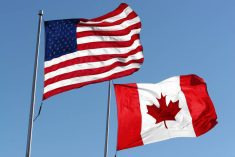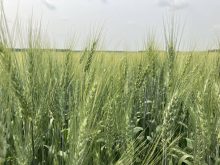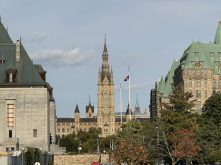Saskatchewan Premier Brad Wall is heading to South Korea and China this month to help build export markets for the province’s agricultural and mining products.
The 11-day trip, which was scheduled to begin Sept. 17, will cost taxpayers $130,000 and coincides with a trade mission led by the Saskatchewan Trade and Export Partnership that includes 16 exporters, Saskatchewan Pulse Growers, the Saskatchewan Flax Development Commission, the Saskatchewan Canola Development Commission, Cereals Canada, the University of Saskatchewan, the University of Regina and Saskatchewan Polytechnic.
Wall said exports to China have doubled in the past five years to $3.36 billion, while exports to South Korea rose from $86 million in 2014 to $104 million last year.
Read Also

Farming Smarter receives financial boost from Alberta government for potato research
Farming Smarter near Lethbridge got a boost to its research equipment, thanks to the Alberta government’s increase in funding for research associations.
“Of course, food has been a top seller,” he told reporters.
“We’ve become the number one food-exporting province in the country.”
China is Saskatchewan’s second largest export market, and Wall said improved access under the new free trade agreement with South Korea should provide better opportunities for beef and other commodities.
“We now have a bit of an advantage, or at least a level playing field, with competing countries like Australia and others who dominated after they had free trade agreements,” he said.
Wall congratulated Prime Minister Justin Trudeau for raising the issue of blackleg in canola during his recent trip to China and said he would do so as well.
This is Wall’s third trip to China, where he will deliver keynote addresses and meet with agricultural organizations and companies.
This will be the first trip ever by a Saskatchewan premier to South Korea.
The STEP mission participants will look at new opportunities in South Korea as a result of zero tariffs on canola, flax seed, wheat, rye, oats, mustard and canaryseed and the decreasing tariffs on peas, lentils, chickpeas and quinoa.
They will also participate in the China-Saskatchewan Agricultural Trade Conference to celebrate 60 years of supplying the Chinese market with quality food ingredients. As well, participants will tour China Vermicelli in Yantai.
Wall said the Saskatchewan Party government the government has gone to 11 countries since it took office in 2007 to work to diversify exports away from the United States.
The U.S. market is mature with a business-to-business relationship, he said, whereas in Asia many of the importers are state-owned. Governments and state-owned enterprises value relationships with other governments.
Wall said it is sometimes hard to identify which deals result from government presence, but exporters have asked the government to go.
The province is in austerity mode after plunging oil prices put the government into deficit last year, but Wall said it’s important to continue with an economic growth plan and attract new investment.
Contact karen.briere@producer.com


















